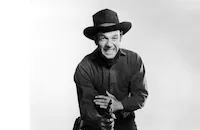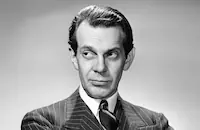Barricade

Brief Synopsis
Cast & Crew
Peter Godfrey
Dane Clark
Raymond Massey
Ruth Roman
Robert Douglas
Morgan Farley
Film Details
Technical Specs

Synopsis
When a wagon carrying Aubrey Milburn and fugitive Judith Burns overturns in the desert, the injured passengers are brought to Boss Kruger's gold mine, thirty-five miles from the nearest town. Judith is badly hurt, but Kruger advises Milburn that despite his broken ankle, he will be expected to work for his keep. Later, Milburn witnesses a fistfight between Kruger and Bob Peters, another new arrival, when Peters refuses to work with explosives. Milburn learns that the mine is staffed with fugitives and criminals, whom the brutal Kruger keeps virtual prisoners. When Milburn questions the men, however, they reveal nothing. One night, pretending to clean, Milburn searches Kruger's room. Kruger comes in unexpectedly, but rather than punishing Milburn, initiates a discussion of power and evil. When Kruger learns that Judith is dying, he challenges Milburn to save her life, but adds that if Judith recovers, he will send her back to prison. Despite his conflicting feelings, Milburn, aided by Peters, tends to Judith's wounds. Moved by Milburn's actions, the judge, a drunken reprobate, throws out his liquor and prays for her recovery. After Judith recuperates, she begs Kruger not to send her back to town, and his callous response leads to another fight between Peters and Kruger. Later, the judge begs Kruger for a chance to help the other men reform. Kruger allows it, but after the judge's impassioned speech, Kruger eggs the men to attack and ridicule the judge, who then tells everyone that Kruger murdered his own brother in order to keep the mine for himself. The judge adds that Kruger's nephew Clay has vowed to avenge his father and that all of Kruger's men will be expected to fight on Kruger's side when Clay arrives. At the end of his speech, the judge kills himself. Some time later, Peters sets off a blast in the mine that is intended to kill Kruger, but, unknown to the other men, the blast merely traps him. While Kruger digs his way out, the men, believing that he is dead, celebrate. Peters and Judith take one of the wagons, hoping to cross the nearby desert and start a new life. Milburn reveals to the men that he is Clay's lawyer and is looking for evidence against Kruger. When Kruger suddenly appears after digging his way out of the mine, Tippy, one of the miners, reveals Milburn's identity to Kruger and also betrays Peters. Kruger then offers all the miners shares in the gold and allows them to beat up Tippy as a traitor. When Clay arrives at the mine with his men, a gunfight breaks out. Meanwhile, Judith and Peters are forced to return when they discover that Kruger had salted the water bags on the wagon. When Judith and Peters arrive at the mine, they find that it has burned down, Clay is dead and Milburn is badly injured. Kruger, however, has survived. During an ensuing fight between Kruger and Peters, the mine collapses, killing Kruger. Judith, Milburn and Peters then leave together for town, planning to make their amends to society.

Director

Peter Godfrey
Cast

Dane Clark

Raymond Massey

Ruth Roman

Robert Douglas
Morgan Farley
Walter Coy
George Stern
Robert Griffin
Frank Marlowe
Tony Martinez
George Lloyd
John Halloran
Jack Montgomery
Billy Vincent
Leo Anthony
Steve Stephens
George Bell
Artie Artego
Benny Corbett
Ted Mapes
Crew
Eddie Allen
Claude E. Archer
Dan Brown
Herschel Brown
Larry Butterworth
Patricia Davidson
Lloyd Edwards
Saul Elkins
Stanley Fleischer
Ray Foreman
Bud Friend
William Fritzsche
Carl Guthrie
Faye Hanlon
Chuck Hansen
Stewart Hiss
Lou Jennings
Victor Johnson
Clarence Kolster
William Lava
Charles Maxwell
Charles Mock
Fred Morgan
William Sackheim
Eric Stacey
Claude Swanner
Dolph Thomas
William Wallace
Perc Westmore
Sid Zipser

Film Details
Technical Specs

Articles
Barricade
By Violet LeVoit

Barricade
Quotes
Trivia
Notes
The first reel of the film was missing from the viewed print. A March 15, 1949 Hollywood Reporter news item notes that Claude Rains was cast in the film, but he does not appear.














